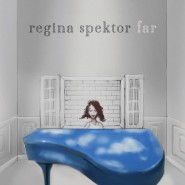 Regina Spektor
Regina SpektorFar
Score: 78
Regina Spektor released her newest album, Far, this week, and while it is somewhat unlike her two most well known albums, Soviet Kitsch and Begin to Hope, this is not a problem in itself. The pervading sound of Far is childish in nature, and while some might consider childishness to be undesirable, it is important to remember that Spektor’s work is most often associated with antifolk, which includes a healthy amount of mocking both of itself and of other, more serious music. Far may not be Spektor’s masterpiece, but it is certainly worth listening to.
Regina Spektor has included quite a number of deceptively simple lines on Far. At about the 35-second mark of “Blue Lips,” which will probably best be remembered for it’s striking but delicate chorus, the piano moves into unison with the vocals. Immediately after the Spektor finishes her line, the piano line blends into an emerging string line that then begins to descend, creating an extremely simple, but carefully constructed transition to the second verse.
Later in the album, “Dance Anthem of the 80’s” starts with a piano line simple enough that it actually sounds like it was played by a small child. Spektor then vocalizes both in unison and the exact same rhythmic pattern as the piano, creating what sounds as if it will soon become extremely obnoxious. Thankfully, the drums pick up with a hat on the off-beats, and the vocal pattern shifts, changing to a more tenuto pattern with imaginative turns and grace notes, resulting in a highly creative track. While the musical talent on Far may sometimes be hidden, this simply creates a layer of suspense which actually propels the album and listener forward towards the next overtly detailed section.
Spektor’s vocals have always been entertaining not only for their quality, but also for the ways in which they’re incredibly odd and idiosyncratic. Throughout Far, she maintains a jagged ebb and flow, transitioning effortlessly but occasionally unexpectedly from quick-tempoed statements to smoother whispers for an overall satisfying effect. Especially notable are the few sections with notable modulation, including the section of “Machine” where Spektor turns repetition of “Hooked into machine” into an industrial, lively but deep section. However, Spektor’s voice occasionally becomes rough or out of tune, especially in her higher range, which can also become extremely breathy; her voice also, most visibly on “Laughing With,” slips from time to time into a slight lisp, lending an odd quality to the sound. Nevertheless, Spektor’s vocals mix quite well with the rest of the music to produce an excellent overall effect.
The vocals are not the only part of Far that sometimes stand on shakier ground than the rest of what is an even surprisingly strong album. Tracks like the plodding “Human of the Year,” easily become tedious, even (in this example) at only around four minutes long. Moreover, because the instrumentals remain light throughout the album, Far depends heavily on the vocal excellence of Spektor, causing tracks where the vocals falter, such as “Laughing With,” to suffer significantly.
Despite the occasional issue, the majority of Far remains quite strong, maintaining a sense of humor that brightens even the most disturbing images that Spektor projects in her lyrics. On “Two Birds,” this is achieved through what sounds like a tuba, which interjects a lively solo segment straight out of musical theater throughout the track. One of the most successful tracks on the album is “Folding Chair,” if only because the track remains extremely upbeat - even during the heavy, cymbal-laden sections, Spektor brightens the track up by imitating a dolphin.
Far is filled with the same excellent combination of surrealism, reality and the mind of Regina Spektor that she’s demonstrated in her previous work. “The Calculation” begins the album with a strange but oddly fascinating image: “You went into the kitchen cupboard / Got yourself another hour / And gave half of it to me.” Far never quite lets go of the strangeness it begins with, even when it tries to step further into reality with tracks like the perplexing consideration of religion on “Laughing With.” By turns, Spektor draws futuristic images (“Machine”) and the contents of a stranger’s wallet on the aptly named “The Wallet.” Even when making the dolphin noises of “Folding Chair” or the exalting hallelujahs of “Human of the Year,” both of which (at least slightly) reach beyond the normal surrealism of the album, Spektor’s obvious enthusiasm for her subjects keeps Far from becoming ridiculous.
Though Far doesn’t directly benefit from its lyrical eccentricity or vocal quirks, they certainly contribute to the album’s striking quality. Nevertheless, while Far uses many of the same techniques and displays the same traits as Spektor’s earlier work, it doesn’t quite match up to Begin to Hope’s depth or Soviet Kitsch’s elegant simplicity. This isn’t, however, to say that Far doesn’t succeed in its own right. It’s certainly quite interesting, and after the few listens it takes to properly sink in, is honestly quite good.
This post is tagged 70-79, Regina Spektor